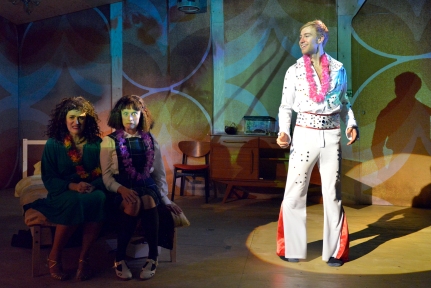In late summer and early autumn, I saw two plays on the big stages: one is regarded by everyone as a classic; the other is known a little less as a play but I nonetheless heard everyone rave about it. There is always a bit of trepidation when I see a play this well-regarded – just sometimes, I don’t share the enthusiasm of everyone else. Classic plays can also be let down by misguided productions. So how did these two fare against high expectations.
Skip to: Toast, Educating Rita
Toast

Toast isn’t your usual subject material for a play. Nigel Slater has made a name for himself as a chef, but to most people he is better known for his writing about cookery. However, Toast – his memories of his childhood and how he decided to cook for a living – is his smash hit. Originally a book, it was made in a very successful TV programme, and now it’s a stage play. Autobiographical plays are often overrated; there are countless solo plays around at the moment from actors who I suspect substantially overestimate how interesting their life stories are to other people. But the thing that I think makes this such a success is how Toast accidentally captures a snapshot of life in the 60s and 70s through the eyes of a child.
It is the child’s perspective that makes the play the success it is. A strong theme running throughout the play is the difference in attitudes of those two decades, but that is revealed slowly through a child’s innocence. To begin with, it’s mostly simple things: holidays, school games, and most precious to young Nigel, cooking together with his mother. This recreates so convincingly the little things in live that give a child so much joy, and resonates so strongly right down to us recognising the favourite sweets that we once oh God damn it I miss being kid … Sorry, where was I?
The first sign of a different time is Nigel’s father with his attitudes to gender roles, some old-fashioned, some just bizarre. In the latter category is the incredibly arbitray and confusing list of which sweets are boys’ sweets and which are girls. A bit more of a problem is his attitude to Nigel’s favourite hobby. Remember, this is the 1960s, four decades before masculine sweary TV chefs were invented, so Dad thinks cookery is for women, otherwise it will turn you into a Nancy boy (where, to be fair, he wasn’t entirely wrong, but that’s a later chapter in this story). However, young Nigel’s carefree life is about to be changed forever. His mother’s asthma attacks are getting worse. The moments when his mother tries hide what’s happening from her is one of the most moving pieces of theatre I’ve soon. And then … it’s the 1970s. Nigel is now a teenager, in a much scarier world.
Nuance plays an important part in the story too. Nigel’s father might not have the most progressive attitudes, but he is not a bigot and more a product of his time, doing the things people like him are expected to do, thinking the things people like him are expected to think. Father and son are never that close because he views bonding as the mother’s job, and once all parental responsibilities are thrust upon him, he’s really out of his depth. Tensions especially arise when a new woman enters if life. But way this is resolve is once more a touching moment of the play.
A lot of people have been praising the play for the music. I loved the music too, but the choice is cleverer than most people appreciate. It is isn’t just greatest hits from the years of the play. As a child, the songs we hear are his mother’s favourites, gentle songs to reflect a gentle life. Whilst the songs later in the play, including Psycho Killer which everyone raves about, belong to the more unsettling world that Nigel now lives in.
In the interests of balance I am obliged to say that the factual accuracy of the story is disputed. Specifically, the depiction of stepmother Joan Potter (real name Dorothy Perrins) is one that her family contests. The play does tone this down a bit compared to the film version; on the screen she is shallow social climber and a complete bitch to young Nigel – in the stage version, some of the worst moments are left out and the resentment is portrayed more as a two-way escalation. Nevertheless, this is a good time to remind everyone that plays based on real events need to be treated with some caution – creative writers get a lot more freedom than journalists and factual claims don’t always get the scrutiny they should. This doesn’t dent the enjoyment of the play, but, as with all stories based on real events, the factual content should be treated with due caution.
That disclaimer outside, Toast is a good all-rounder. A lot of stage adaptations made famous as a screenplay first play it safe and try to be scene-by-scene remakes, which is fine, but this could easily have been written as a stage play from the outset. That’s something that may have been helped by Director Jonnie Riordan also being the choreographer, so congratulations to him and script writer Henry Filloux-Bennett for the stage version between them. The tour is still going and will be coming to York Theatre Royal in late November (19th-21st), but there will surely be another tour after this one. Well done to creative team and the five-strong ensemble for a play that’s still stick with me over a month later.
Educating Rita
 (An early version of this review was given during my Edinburgh fringe coverage. This is a tidied up version.)
(An early version of this review was given during my Edinburgh fringe coverage. This is a tidied up version.)
The other high-profile tour that got me interested was Theatre by the Lake’s production of Educating Rita. But although Theatre by the Lake is based in Cumbria, this is very much a north-east production. Stephen Tompkinson, has been in numerous TV series, but in the north-east he is also known for the plays he does with Live Theatre, including the complete psycho Freddie the Suit in Faith and Cold Reading and shady non-league football manager Kidd in The Red Lion. This time he is of course playing Frank, who isn’t a psychopath, merely a schambolic/alcoholic lecturer. The other big name from Live Theatre is Max Roberts, who stepped down as artistic director last year and – as is a good idea for recently-retired artistic directors wishing to give their successors some space – is keeping himself busy directing this touring production.
But whatever big names might be selling the tickets, it is Jessica Johnson who makes this play what it is. Two years ago she played Rita as the Gala Theatre restarted its in-house productions and – no disrespect to the other guy – she stole the show. There is of course a whole range of emotions Rita needs to go through in any successful production of this play, but Jessica Johnson brings it out from the start. In scene 1, Rita walks into Frank’s life brash and in-your-face and ready to be educated, but it doesn’t take much for her insecurities to come through, the result of a lifetime of being told this life’s not for people like her. As the story continues, and the goes through the end of her marriage and a discovery of a new self and finally standing up to Frank as an equal, Johnson gets all of this.
Max and Stephen deserve credit too. Tompkinson’s touch I liked the most was Frank’s alcoholism. As the scenes progress, his movements become increasingly impaired, whether or not he’s actually drinking anything at the moment. Much as I enjoyed the Gala production, one small but annoying issue was the set and movements that messed around the sightlines for anyone sitting in the front half of the theatre. This set is laid out more sensibly and, although he was in an enviable position to have such good actors to work with (not to mention such a great play), Roberts did what he needed to do.
I don’t ned to do a full review of this – my comments from the Gala’s 2017 production apply here. Apart from the sightline issue that was fixed here, all of the viritues of this productions were pioneered in the one directed by Rebecca Frecknall. As such, it’s a pity that she and the Gala Theatre are absent from the credits here, having done so much to lay the groundwork for this. But they have a lot to be proud of, and I hope they realise it.

 I didn’t pay much attention to The Red Lion when Live Theatre first announced it because neither the play nor the author rang a bell. But it should have done, because whilst I didn’t remember the name, I certainly did remember one of his plays, Dealer’s Choice, performed by a then-unknown Dugout Theatre shortly before their rise to stardom. This play, a dark play about six men trapped in a dangerous spiral of high-stakes poker, always stuck in my mind amongst the hundreds of plays I’ve seen. He’s notable for other plays too, but this is the one I based my high expectations on, and he did not disappoint.
I didn’t pay much attention to The Red Lion when Live Theatre first announced it because neither the play nor the author rang a bell. But it should have done, because whilst I didn’t remember the name, I certainly did remember one of his plays, Dealer’s Choice, performed by a then-unknown Dugout Theatre shortly before their rise to stardom. This play, a dark play about six men trapped in a dangerous spiral of high-stakes poker, always stuck in my mind amongst the hundreds of plays I’ve seen. He’s notable for other plays too, but this is the one I based my high expectations on, and he did not disappoint.




